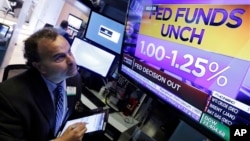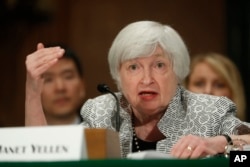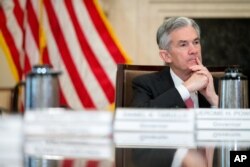Officials of the U.S. central bank decided to keep the key U.S. interest rates steady at a relatively low 1-1.25 percent level Wednesday.
In a statement, Federal Reserve officials left open the possibility of raising rates in December because of a "strong" labor market and “solid” economic activity.
During the recession, the Fed cut the interest rate to historic lows in an effort to boost economic activity. Lower borrowing costs help to stimulate investment, but officials say the recovering economy no longer needs so much help. Keeping rates too low for too long risks sparking damaging inflation, so the bank has been gradually raising rates closer to their historic averages.
Fed experts say the economy grows best when inflation is a modest two percent. But outside the volatile areas of food and fuel, prices in the overall economy now are growing at an annual rate of just 1.3 percent.
Bankrate.com chief financial analyst Greg McBride is skeptical that inflation will rise to a healthier level soon. He says the Fed insists inflation is going to "move back to 2 percent" but "the evidence doesn’t materialize. Either the data-dependent Fed has started to ignore that data point, or they know something we don’t.”
Policymakers also downplayed the impact of recent storms, calling a decline in hiring in September a temporary blip. Recent government data show the economy grew at a better-than-expected 3 percent annual rate in the third quarter.
Meanwhile, President Donald Trump is expected to name a new leader of the Federal Reserve on Thursday. Current Fed chair Janet Yellen’s four-year term expires early next year. She remains a candidate for a second term, but unnamed sources inside the White House suggest Trump is leaning toward naming Federal Reserve Board Governor Jerome Powell.
Analysts say Powell probably would continue the current cautious and gradual approach of raising rates.
“Jerome Powell represents continuity from the Janet Yellen Fed,” according to McBride. “He has served as a Fed Governor, he has been consistent with the Yellen Fed, not voting against the decisions of the Fed.”
More conservative choices include Stanford University economist John Taylor and former Fed Governor Kevin Warsh, who analysts say would take a more “hawkish” approach, meaning they would be more likely to raise rates to fight inflation.
McBride says choosing the next U.S. Fed chief is a crucial decision that could affect economies elsewhere.
"A lot of the things that happen here have an outsized impact in emerging economies elsewhere around the globe. There’s a lot of borrowing globally that takes place in U.S. dollars. So yeah, there’s a definite ripple effect that stands well beyond U.S. shores," said McBride.








